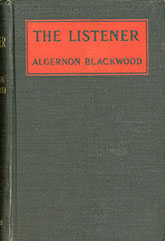The Willows
Critique • Quotes
 Story collection first edition, 1907
Story collection first edition, 1907First publication
1907
Literary form
Novella
Genres
Fantasy, horror
Writing language
English
Author's country
England
Length
Approx. 19,500 words
Horror that creeps up on you
With a few exceptions, I dislike the kind of horror and fantasy that's in your face—tales that start with incredible, supernatural phenomena and then keep building on it, getting wilder and wilder. It just seems...well, not credible.
As opposed to a more naturalistic approach that first draws you into the story and characters. And then, when you're hooked, ratchets up the wonder by gradually introducing the horrific or fantastic elements. You're eased across, into the mirror world, without noticing the transition.
Something like that is achieved in Algernon Blackwood's lengthy story, The Willows. (Actually just long enough to be classified as a novella.)
The first twenty pages or so read like an exciting adventure, as two friends paddle a Canadian canoe down the Danube River. As they journey across eastern Europe, however, the environment is dense with foreboding.
The atmosphere darkens much as in a Joseph Conrad tale, such as in the novella Heart of Darkness from about the same period. Conrad, though, always reads like a journey into the darkness of the human heart. For Blackwood, it's a trip into a non-human or extra-human reality.
Growing dread
Especially in this story it's the willow trees crowding the river that nurture a growing dread. The first-person narrator at one point even directly references this gradual movement from the everyday to the extraordinary:
When common objects in this way become charged with the suggestion of horror, they stimulate the imagination far more than things of unusual appearance; and these bushes, crowding huddled about us, assumed for me in the darkness a bizarre grotesquerie of appearance that lent to them somehow the aspect of purposeful and living creatures. Their very ordinariness, I felt, masked what was malignant and hostile to us.
When the exploring duo decide to camp overnight on a spooky island in the river, they experience strange phenomena. But it's still not full-blown horror. The events could still be interpreted as natural, perhaps fanned into something scarier by the men's imaginations.
Even when it becomes obvious that supernatural forces are at work, we are never really sure what they are. The willows of the title are either demonic or godly, they are to be feared or worshipped, they are bringing either death or revelation. Or all the above.
By this time, the reader is so immersed in the story, this doesn't feel unreal. We struggle with the lead characters as they deal with an incredible shrinking island, strange bodies in the water, siren calls to suicide, and those menacing, other-worldy trees. We continue to follow the twists and turns as they try to salvage their lives from the attacks of the nebulous natural forces.
These forces are never explained, at least not in any human terms. I think we are supposed to take from this that some things are beyond our ken—not something I believe, but something I can temporarily hold onto while reading this story.
If all this sounds like a lot of horror cliches, bear in mind the story was published more than a century ago. Many of the standard elements of scary stories today were adopted from horror classics like The Willows at the beginning of the twentieth century.
— Eric
Critique • Quotes

